
How to Promote Sustainability by avoiding food-waste?
Hi everyone, welcome to my blog, and the topic of this blog is reminding all people to avoid food waste and to be sustainable from ourselves.
Sustainability has always been the focus of attention and discussion in the world, and avoiding food waste is one of the most important part in promoting sustainability. Food is indispensable existence in our daily lives. However, most of people have no awareness of sustainability, so they are still wasting food. The Food and Agriculture Organization (FAO) of the United Nations showed that an estimated 1.3 billion tonnes of food is wasted globally every year, one third of all food produced for human consumption (The Food and Agriculture Organization of the United Nations, n.d).
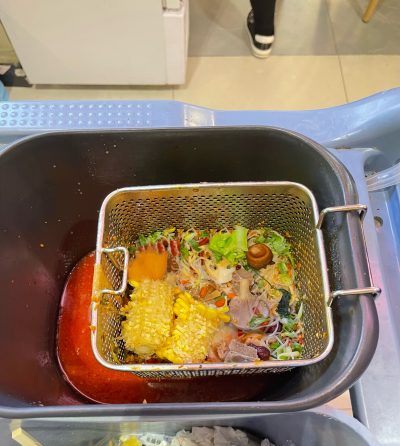
Wastes
Actually, food production requires large input of land, water, energy and carbon emissions from growing in the soil to being processed and transported to people. If people waste food, more resources will be wasted. At the same time, more carbon emissions would damage the environment. For example, wasting a 1/3-pound hamburger is equivalent to wasting 660 gallons of water (Davis, 2021). How many times can people to use those water in other ways and how many people can be helped by those water?
When I had no awareness of sustainability, I wouldn’t consider that wasting food may lead to the sustainable problems. Specifically, I didn’t think it’s a big matter because I paid for them and it happened just for once or twice occasionally. When I was full and did not want to eat, I would stop eating though there were plenty of leftovers there. I also wouldn’t pack them because I think that other employees would deal with them properly. However, if all people think in this same way, how many food would be wasted? How many resources that could be provided help for other people or other industries will be wasted?
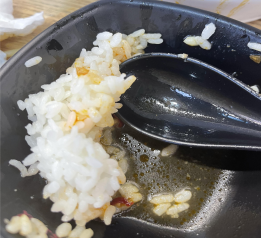
Before, I wasted rice
A few days ago, I did a small survey online unintentionally about the rice, which gave me an impressive image. If we just eat rice one or two time in a week, 26kg gas emissions will be released, and 13153 litre of water will be used as following screenshots showed.
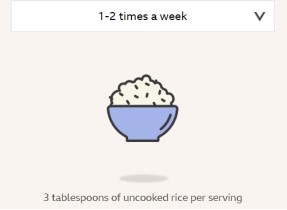
Screenshot 1/photo https://www.bbc.com/news/science-environment-46459714
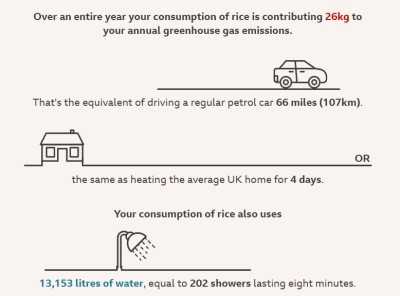
Screenshot 2
After this small survey, I deeply understood that how many resources need to be consumed to make food. The survey also showed that the food we eat and waste is the most powerful factor behind environmental issues such as climate change. (Stylianou et al, 2019).
So I would like to change from myself to have plans to buy food, save food and promote sustainability from the root. In the following aspects, I will show you some detailed steps about how I doing in my daily life. Let’s go!
I want to start from “Empty plates action” , which means eating all food in the bowls and plates! let me start with preventing waste and protecting the environment from small things!
First of all, I only buy what I need. Before I want to buy food, I would look at what’s in my fridge (UQ Sustainability, 2019). It’s important to confirm my needs and pantry before going shopping for more. For instance, I still need two tomatoes and one carrot to make dishes. Then I will buy them rather than buy them blindly and left food until getting bad.
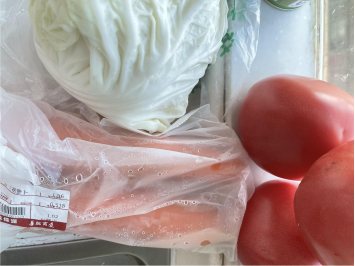
Vegetables in my fridge and carrots I bought for a day
Second, making shopping list is also helpful to buy food that I need for that day and stick on it (UQ Sustainability, 2019). Now I would like to make a shopping list for food. That day, I wanted to eat curry rice,, but I found that there was no carrot in my fridge, so I would buy two without extra food. I also write them down to make them clear. As photo showed below.
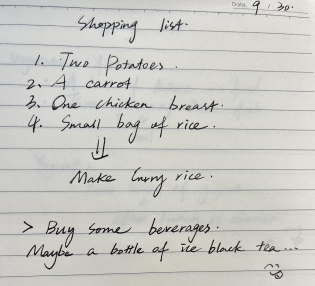
Shopping list 1
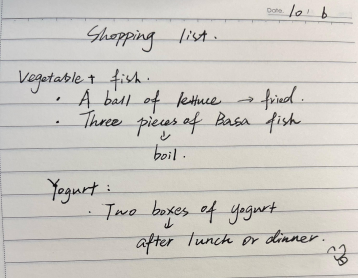
Shopping list 2
Third, although it is impossible to be completely waste-free, but after I understanding the sustainability deeply, I tried to apply it in my life as much as I can. Above steps are also crucial for me to follow in my daily life. Now when I cook at home, I cook carefully and make sure the quantities of dishes that I can eat all of them. if I go to a restaurant, the most important part is also finishing all my orders without leftovers rather than ordering all dishes I want. The production of food itself requires a lot of resources. If I wasted them, more resources will be wasted and carbon emissions will be generated, which causes more environmental issues and severe consequences. At the same time, if the leftover food or rotten food is not properly disposed of or it is placed randomly, some sorts of substances inside food may deteriorate and might be mixed with other things and cause damage to the land and the air. Therefore, we need to start from eating all food to make contributions.
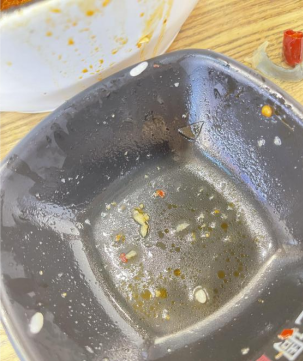
Eat all of rice

Whenever I finish my orders, I feel a strong sense of achievement.
Now I have more awareness of sustainability with deep exploration when I began to learn COMU 3130 course, which taught me a lot and gave me inspiration. In fact, sustainability is not complicated and difficult to achieve as we imagine before. It just needs us to start actions and start with small things. For example, we plan food needs as much as possible in order to avoid wasting more resources, respect food, respect land, respect the environment, and to achieve sustainability together?Let’s begin from small things to protect food and avoid wasting!
References:
Davis, B. (2021, March 17). How much water does it take to produce one hamburger?
Mvorganizing.org. Retrieved from:
https://www.mvorganizing.org/how-much-water-does-it-take-to-produce-one-ha mburger/
Stylianou, N., & Guibourg, C., & Briggs, H. (2019, August 9). Climate change food calculator: What’s your diet’s carbon footprint? BBC News. Retrieved from:
https://www.bbc.com/news/science-environment-46459714
The Food and Agriculture organization of United Nations. (n.d). Food loss and Food waste. Retrieved from:
https://www.fao.org/food-loss-and-food-waste/flw-data)
UQ Sustainability. (2019, December 9). Shopping lists can help tackle food waste. Retrieved from:
https://sustainability.uq.edu.au/projects/recycling-and-waste-minimisation/shoppi ng-lists-can-help-tackle-food-waste
